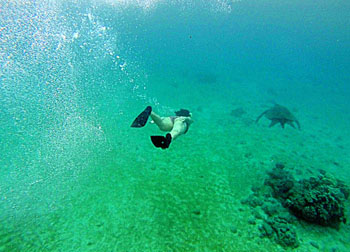Campus News
Food, agriculture and adventure on Maui: UCSC students get down and dirty on alternate spring break
A unique alternative spring break program gives students a way to explore Maui’s food systems and allow some hands-on learning



Instead of just kicking back on a warm beach during spring break, 12 UC Santa Cruz students spent part of their March hiatus covered in sticky, brown mud.
They found themselves in that mucky situation as they weeded a traditionally farmed taro patch in Maui — the way residents of the Pacific island have done for 700 years. Their experience was part of a unique alternative spring break program organized by UC Santa Cruz’s Center for Agroecology and Sustainable Food Systems and the Office of Physical Education, Recreation and Sports as a way to explore Maui’s food systems and allow some hands-on learning — which meant getting down and dirty with a taro patch.
The week-long trip had students building permaculture berms and harvesting turmeric on an organic farm and retreat center overlooking the Pacific, visiting a coffee farm, touring a botanical garden, snorkeling, and watching the sunrise from the 10,023-foot Haleakula volcanic crater.
It was just one of several alternative spring breaks offered at UCSC this year. In addition to learning about ancient and modern food practices on Maui, UC Santa Cruz students also worked in soup kitchens and at homeless shelters in New York City, and did volunteer work in the community of Live Oak in Santa Cruz County.
The trips were funded by the students themselves and by undergraduate student fees. Some trips offer class credit.
“We blended experiential learning with adventuring aspects,” said Tim Galarneau, food systems education and research program specialist at UCSC, who co-led the Maui trip with Kresge College sustainability and social justice instructor David Shaw.
Dubbed “Maui Wowi: Food, Agriculture and Outdoor Adventure,” the trip was sparked, in part, by UC Santa Cruz alum Elan Goldbart, a 2013 Kresge College graduate in environmental studies, who landed a job managing the Hale Akua organic farm and retreat center located on Maui’s lush east side.
According to Galarneau, Goldbart is using much of what he learned at UCSC not only to run the farm but also to set up a three-month WWOOF (World Wide Opportunities on Organic Farms) program at the Hale Akua farm and retreat center. WWOOFers spend time living and learning on organic farms around the world.
UCSC’s spring break students jumped right into the learning process. Some cleared grasses and bamboo with machetes in preparation for building a permaculture project on the property. Others harvested turmeric and planted banana trees while learning how these crops are produced.
“It felt great to work hard,” said Rebekkah Scharf, a 20-year-old literature major from Stevenson College who discovered a passion for organic farming and food justice at UCSC. “The whole time we were learning while doing.”
Students also toured a botanical garden with plant collections from around the Pacific Islands and talked about a grassroots referendum asking for a temporary ban on genetically modified farming and research on the island. They wandered through Kupaa Organic Farms on the leeward slopes of Haleakala where coffee, pineapple, taro and sweet potatoes are among the crops sold at farmers’ markets on the island. They camped on beaches, swam in the ocean, hiked to waterfalls, and cooked meals together — including a curry made with turmeric they harvested.
“We got to experience this island in a way most people never think of or have a chance to do,” said 22-year-old Stevenson College student Zoë Chertov who is majoring in community studies and will graduate in June. “I got a wider vision of the place and who the people are and what some of the cultural aspects look like.”
“I find extended trips where people learn, live, and cook together to be transformative,” Galarneau said.
For Scharf, the trip was exactly that.
At Kapahu Farm and Camp, located near the end of the twisting Hana Highway, she told of sitting down with lifelong Maui resident, Aunt Tweetie Lind, to learn about ancient ways of growing taro.
It wasn’t long before Aunt Tweetie asked about Scharf’s ethnicity and Scharf told her that she was “hapa,” half-Asian, half-white.
“We started talking about how everyone in Hawaii is more or less mixed race,” said Scharf, who said she knows what it’s like to be judged and affected by racial stereotypes. “And being in a society (in Hawaii) where everyone looked the same as me? I never had that experience before.”
Said Scharf: “That trip was life-changing.”
Two other alternative spring break projects saw students lending their hands and energy to two communities, each on different coasts.
New York: Sixteen students traveled to New York City as part of UCSC’s Student Volunteer Center Alternative Spring Break project, according to Lucy Rojas, assistant dean of students. There, students served lunches to hundreds of homeless and disadvantaged residents, worked in day-care programs at local shelters, and visited community organizations where they learned about structuring non-profits and delivering services to those in need.
Live Oak: Fifteen students stayed closer to home, volunteering in the Santa Cruz community of Live Oak. They worked at the Mesa Verde Community Garden, shared lunch with families at the Live Oak Family Resource Center, recycled with the Grey Bears, and participated in a beach cleanup, according to Abbey Asher, service learning coordinator for College Nine and College Ten. They also heard from speakers, ranging from UCSC Psychology Professor Regina Langhout to activists Yolanda Provoste and Mariah Roberts.